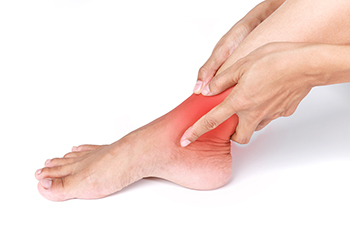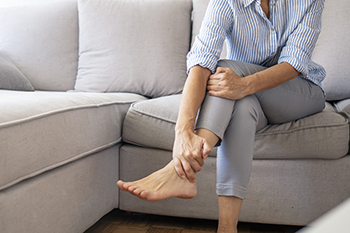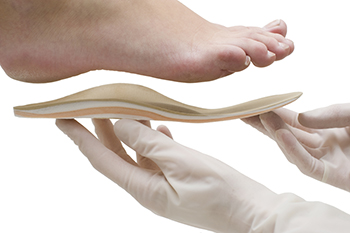Items filtered by date: June 2023
Arthritis and Ankle Pain

Ankle pain can be caused by various things. Arthritis is a common reason people may have ankle pain, and can wreak havoc on completing daily activities. Several types of arthritis can affect the ankle. Studies have shown osteoarthritis is the most common form of arthritis and is considered to be a chronic condition. When it affects the ankle, it is found at the point where the ankle meets the shinbone. Typical symptoms of this type of arthritis can consist of pain and stiffness, and the ankle may be difficult to move. The feet and ankles can also be affected by rheumatoid arthritis, which can happen when the body’s immune system mistakenly attacks the ankle joints. Juvenile arthritis can develop in people who are under the age of 16, who may notice their feet and ankles are painful and swollen. If you have ankle pain, it is suggested that you contact a podiatrist who can determine if arthritis is the cause and offer effective treatment methods.
Ankle pain can be caused by a number of problems and may be potentially serious. If you have ankle pain, consult with one our our podiatrists from Newtown Comprehensive Foot Care. Our doctors will assess your condition and provide you with quality foot and ankle treatment.
Ankle pain is any condition that causes pain in the ankle. Due to the fact that the ankle consists of tendons, muscles, bones, and ligaments, ankle pain can come from a number of different conditions.
Causes
The most common causes of ankle pain include:
- Types of arthritis (rheumatoid, osteoarthritis, and gout)
- Ankle sprains
- Broken ankles
- Achilles tendinitis
- Achilles tendon rupture
- Stress fractures
- Bursitis
- Tarsal tunnel syndrome
- Plantar fasciitis
Symptoms
Symptoms of ankle injury vary based upon the condition. Pain may include general pain and discomfort, swelling, aching, redness, bruising, burning or stabbing sensations, and/or loss of sensation.
Diagnosis
Due to the wide variety of potential causes of ankle pain, podiatrists will utilize a number of different methods to properly diagnose ankle pain. This can include asking for personal and family medical histories and of any recent injuries. Further diagnosis may include sensation tests, a physical examination, and potentially x-rays or other imaging tests.
Treatment
Just as the range of causes varies widely, so do treatments. Some more common treatments are rest, ice packs, keeping pressure off the foot, orthotics and braces, medication for inflammation and pain, and surgery.
If you have any questions, please feel free to contact our office located in Newtown, CT . We offer the newest diagnostic and treatment technologies for all your foot care needs.
Heel Pain Can Be Treated!
Foot Shuffling

Foot shuffling is when someone takes shorter strides and drags their feet when walking. Consistent shuffling can be a sign of an underlying health issue related to the nervous system, joints, or muscles. The most common neurological condition causing a shuffling gait is Parkinson’s disease. Foot shuffling can also come on from foot drop. This is when there is a difficulty or inability to lift the foot while taking a step. This condition can be caused by multiple sclerosis, peripheral neuropathy, or stroke, among other things. As one ages, the gait can change with decreased walking speed and range of motion in the ankles, knees, and hips, as well as impaired foot clearance. When the joints of the legs are tight or there is muscle weakness from injuries, health conditions like arthritis, or long periods of inactivity, a shuffling gait can also happen. Stretching and strengthening exercises, balancing activities, and orthotics can help, as well as assistive devices like a walker or cane. If you have a shuffling gait, it is strongly suggested that you see a podiatrist to help identify the underlying cause and devise an appropriate treatment plan individualized to your needs.
If you have any concerns about your feet, contact one our our podiatrists from Newtown Comprehensive Foot Care. Our doctors can provide the care you need to keep you pain-free and on your feet.
Biomechanics in Podiatry
Podiatric biomechanics is a particular sector of specialty podiatry with licensed practitioners who are trained to diagnose and treat conditions affecting the foot, ankle and lower leg. Biomechanics deals with the forces that act against the body, causing an interference with the biological structures. It focuses on the movement of the ankle, the foot and the forces that interact with them.
A History of Biomechanics
- Biomechanics dates back to the BC era in Egypt where evidence of professional foot care has been recorded.
- In 1974, biomechanics gained a higher profile from the studies of Merton Root, who claimed that by changing or controlling the forces between the ankle and the foot, corrections or conditions could be implemented to gain strength and coordination in the area.
Modern technological improvements are based on past theories and therapeutic processes that provide a better understanding of podiatric concepts for biomechanics. Computers can provide accurate information about the forces and patterns of the feet and lower legs.
Understanding biomechanics of the feet can help improve and eliminate pain, stopping further stress to the foot.
If you have any questions please feel free to contact our office located in Newtown, CT . We offer the newest diagnostic and treatment technologies for all your foot and ankle needs.
Categories of Arthritis

People often take their feet for granted until they begin to hurt. Arthritis in the feet can cause severe pain and discomfort, and it is beneficial to learn proper arthritic foot care. Four types of arthritis can affect the feet. These are classified as osteoarthritis, rheumatoid arthritis, gout, and post-traumatic arthritis. Studies suggest that osteoarthritis is the most common form of arthritis and causes wear and tear to the joints over time. When crystals form in the joints of the big toe, it can be indicative of gout. This is a condition that is caused by genetic factors or by specific types of foods that are frequently eaten. Rheumatoid arthritis, or RA, is an autoimmune disease that can target the joints in the feet causing severe pain and inflammation. If the foot is injured, the patient may develop post-traumatic arthritis, which can be a result of ankle trauma. There are several treatment options available and this often depends on the type of arthritis the individual has. If you have arthritis in your feet, it is strongly suggested that you are under the care of a podiatrist who can guide you toward the correct treatment method.
Arthritis can be a difficult condition to live with. If you are seeking treatment, contact one our our podiatrists from Newtown Comprehensive Foot Care. Our doctors can provide the care you need to keep you pain-free and on your feet.
Arthritic Foot Care
Arthritis is a term that is commonly used to describe joint pain. The condition itself can occur to anyone of any age, race, or gender, and there are over 100 types of it. Nevertheless, arthritis is more commonly found in women compared to men, and it is also more prevalent in those who are overweight. The causes of arthritis vary depending on which type of arthritis you have. Osteoarthritis for example, is often caused by injury, while rheumatoid arthritis is caused by a misdirected immune system.
Symptoms
- Swelling
- Pain
- Stiffness
- Decreased Range of Motion
Arthritic symptoms range in severity, and they may come and go. Some symptoms stay the same for several years but could potentially get worse with time. Severe cases of arthritis can prevent its sufferers from performing daily activities and make walking difficult.
Risk Factors
- Occupation – Occupations requiring repetitive knee movements have been linked to osteoarthritis
- Obesity – Excess weight can contribute to osteoarthritis development
- Infection – Microbial agents can infect the joints and trigger arthritis
- Joint Injuries – Damage to joints may lead to osteoarthritis
- Age – Risk increases with age
- Gender –Most types are more common in women
- Genetics – Arthritis can be hereditary
If you suspect your arthritis is affecting your feet, it is crucial that you see a podiatrist immediately. Your doctor will be able to address your specific case and help you decide which treatment method is best for you.
If you have any questions, please feel free to contact our office located in Newtown, CT . We offer the newest diagnostic and treatment technologies for all your foot care needs.
Benefits of Wearing Custom-Made Orthotics

Orthotics are medical devices that are worn inside the shoe. People who have foot pain or an abnormal foot structure may benefit from wearing orthotics, which may aid in completing daily activities. Custom-made orthotics may help patients who have diabetes, plantar fasciitis, or arch pain. These are designed and fitted by podiatrists and many benefits can be associated with wearing these types of orthotics. These can include improving the gait, or walking style, maintaining body alignment, and possibly relieving foot pain from arthritis. Wearing orthotics may reduce existing ankle pain, and it may be easier to walk. If you have foot pain for any reason, it is suggested that you speak with a podiatrist who can discuss the benefits of wearing custom-made orthotics and determine if this is the right choice for you.
If you are having discomfort in your feet and would like to try orthotics, contact one our our podiatrists from Newtown Comprehensive Foot Care. Our doctors can provide the care you need to keep you pain-free and on your feet.
What Are Orthotics?
Orthotics are inserts you can place into your shoes to help with a variety of foot problems such as flat feet or foot pain. Orthotics provide relief and comfort for minor foot and heel pain but can’t correct serious biomechanical problems in your feet.
Over-the-Counter Inserts
Orthotics come in a wide variety of over-the-counter inserts that are used to treat foot pain, heel pain, and minor problems. For example, arch supports can be inserted into your shoes to help correct overarched or flat feet, while gel insoles are often used because they provide comfort and relief from foot and heel pain by alleviating pressure.
Prescription Orthotics
If over-the-counter inserts don’t work for you or if you have a more severe foot concern, it is possible to have your podiatrist prescribe custom orthotics. These high-quality inserts are designed to treat problems such as abnormal motion, plantar fasciitis, and severe forms of heel pain. They can even be used to help patients suffering from diabetes by treating foot ulcers and painful calluses and are usually molded to your feet individually, which allows them to provide full support and comfort.
If you are experiencing minor to severe foot or heel pain, it’s recommended to speak with your podiatrist about the possibilities of using orthotics. A podiatrist can determine which type of orthotic is right for you and allow you to take the first steps towards being pain-free.
If you have any questions please contact our office located in Newtown, CT . We offer the newest diagnostic and treatment technologies for all your foot and ankle needs.

